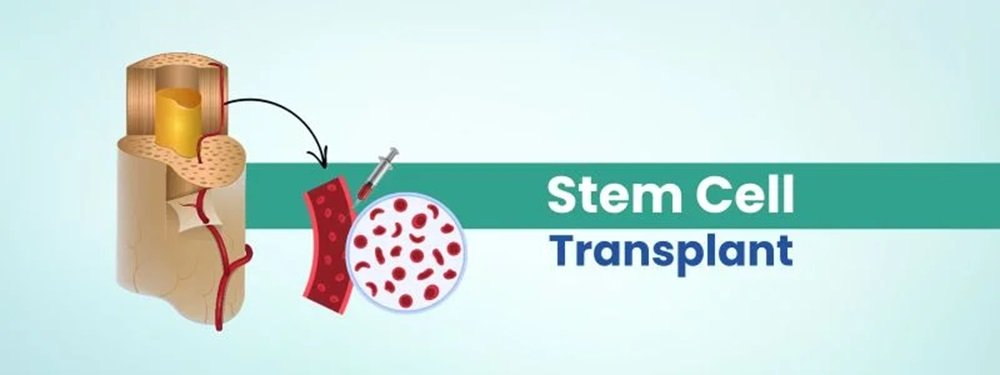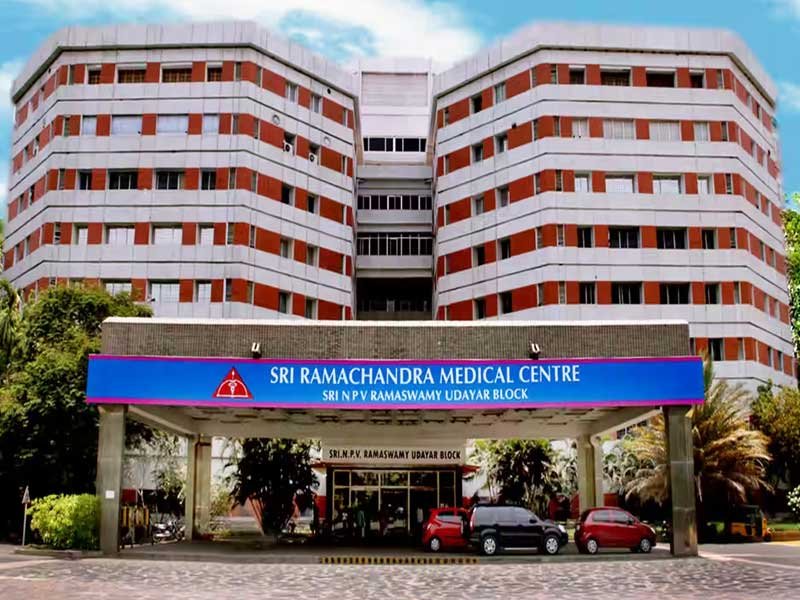Home Treatments Stem Cell Stem Cell Transplant
Are you looking for an effective stem cell transplant to survive complex conditions such as leukemia, lymphoma, and blood disorders?
Good news for you!
India provides advanced facilities and specialized care options for patients seeking effective treatments.
So, choose India for superior stem cell transplant, expertise, and high-quality care to support your recovery. Hospitals there provide advanced stem cell transplant procedures with high success rates and experienced hematologists and oncologists.

Generally, patients get a stem cell transplant to replace damaged stem cells with new ones. This process is performed when the bone marrow is damaged and unable to produce healthy cells.
Conditions why doctors use stem cell transplants include:
The cost of stem cell transplant is affordable as compared to other countries which provide the types of procedures, overall surgical costs, diagnosis, and post-operative care.
Cost Component | Details | Estimated Cost in USD |
|---|---|---|
Pre-operative Consultation & Diagnosis | Consultations, X-rays, MRI scans, blood tests | |
Surgery Costs | Includes surgeon fees, type of surgery, and hospital stay |
There are three types of stem cell transplants such as :
Factors that affect the cost of stem cell transplant are as follows:
Country | Cost Structure |
India | |
United States | |
Germany | |
Turkey |
◾ Key Takeaways
✅ Affordable Treatment Costs: India provides affordable options with high-quality care, surgery, radiation, and chemotherapy with highly skilled specialists and advanced facilities, making quality cancer care accessible to international patients.
✅ Advanced Medical Technology: Indian hospitals provide advanced technology and have modern infrastructure, with high-quality care comparable to international standards at more affordable costs.
Stem Cell Transplant cost
Treatment Name
Estimated Cost
Stem Cell Transplant 4000-10000 USD
Doctors in India are highly skilled in stem cell transplants, which provide expertise in surgery, diagnosis, and chemotherapy. With high-quality care and modern techniques, they also provide effective treatment for each patient's recovery.
Beds: 539
New Delhi
Beds: 230
New Delhi
Beds: 710
New Delhi
Beds: 2000
Hyderabad
Beds: 360
Chennai
Beds: 800
Chennai
Beds: 750
Chennai
Beds: 50
Chennai
Beds: 550
Ahmedabad
Beds: 1000
Hyderabad
Beds: 550
Hyderabad
Beds: 150
Hyderabad
Beds: 204
Hyderabad
Beds: 400
Hyderabad
Beds: 225
Hyderabad

Max Super Speciality Hospital, Saket

Aakash Healthcare Super Speciality Hospital

Indraprastha Apollo Hospital

Yashoda Hospital Hitech City

SIMS Hospital, Vadapalani, Chennai

Sri Ramachandra Medical Centre, Chennai

Vijaya Hospital, Chennai

VS Hospitals, Chennai

Zydus Hospital, Ahmedabad

KIMS Hospital, Secunderabad

Apollo Hospitals Jubilee Hills, Hyderabad

Aware Gleneagles Global Hospital

Aster Prime Hospital

Medicover Hospital, Hyderabad

Rainbow Children's hospital and BirthRight
Indian hospitals for stem cell transplants provide experienced specialists, with advanced technology, and high-quality care, for accurate diagnosis, effective treatment, and supportive recovery for each patient.
Necessary diagnostic tests
Tests | Description |
Blood Test | Blood tests necessary to see blood count, liver function tests, and kidney function tests |
Urine Test | Urine tests determine to check kidney function. |
Imaging Test | It is performed to check the heart's rhythm, an echocardiogram to check the heart and blood vessels and a chest X-ray. |
Pulmonary Function Test | A pulmonary function test is performed to detect lung function. |
Bone Marrow Biopsy | Bone marrow biopsy is needed to identify cancerous cells. |
HLA-Typing | HLA-Typing is done to identify a suitable donor. |
🟢Do’s Before Surgery
✅ You should follow your doctor's instructions about when to stop eating and drinking.
✅ You should also take medications that your doctor approves.
✅ Before treatment, you bathe and remove jewelry, piercings, and contact lenses, and don't apply lotions, perfumes, and deodorants.
✅ You'll also need to undergo a series of tests to ensure you're healthy for the transplant. These tests are electrocardiogram (ECG), echocardiogram, X-ray, CT scan, and blood tests.
🔴Don’ts Before Surgery
❌ You should avoid alcohol, tobacco, and caffeine and also avoid taking anti-inflammatory medications like aspirin, ibuprofen, Motrin, and Advil.
❌ You don’t take other medications without the approval of your transplant doctor.
❌ Do not take NSAIDs (non-steroidal anti-inflammatory drugs) without you have permission from your doctor.
Hospital Stay and Recovery Time
Most of the problems that happen after the transplant from having the bone marrow wiped out by medicines or radiation.
Mouth and throat pain
Nausea and vomiting
Infection
Bleeding
Graft-versus-host disease (GVHD)
Two types of Graft-versus-host disease (GVHD) are:
Acute GVHD
Chronic GVHD
Why Choose Mejocare for Stem Cell Transplant in India?
✅ Team of Top HematologistsWe connect you with highly experienced doctors, each with over 20 years of expertise in stem cell transplants.
✅ JCI/NABH Accredited HospitalsOur partner hospitals are JCI and NABH accredited and provide advanced facilities and advanced technologies, including robotics, machine learning, and high-quality diagnostic tools. These resources support complete and specialized care.
✅ Additional BenefitsMejocare provides quick and detailed responses, accurate cost estimates, assistance with medical visas, accommodation in India, and priority scheduling with top specialists. We also make your arrival in India seamless, with airport pickup, hotel drop-off, hospitalization support, and more.
Stem cells are special cells that transform into another type of cells, especially in people with certain conditions or who have undergone chemotherapy or radiation and may require stem cell transplant. This procedure helps to replace cancerous or damaged stem cells with new ones. Doctors can use the patient’s stem cells before treatment, or they can get it from a donor or family member.
The average cost of Stem Cell Transplant in India is between 4000-10000 USD.
The success rate of Stem Cell Transplant in India is around 90%.
You need to stay in the hospital after Stem Cell Transplant for 3-4 weeks
The expected recovery period after a Stem Cell Transplant in India varies. For autologous transplants, it takes approximately 3-6 months, and for allogeneic transplants, the recovery period is around 12-18 months. Precautions are essential to prevent infections, bleeding, organ issues, and graft-versus-host disease.
Yes, potential risks associated with Stem Cell Transplant in India encompass nausea, vomiting, mouth sores, appetite loss, taste changes, fatigue, hair loss, low platelet levels affecting blood clotting, low red blood cell levels leading to anemia, diarrhea, and weight loss.
Yes, it is necessary to have a companion.
Wait at least six months before considering any travel post-Stem Cell Transplant in India.
Yes, you can do your own research and choose your therapist.
You can use Paracetamol regularly to manage mild to moderate pain. Moderate pain can be managed using non-steroidal anti-inflammatory drugs (NSAIDs) like diclofenac or ibuprofen.
Yes, insurance will cover the cost of Stem Cell transplants in India.
To discover the top doctors or hospitals in India, you can visit our website, mejocare on the doctors' page, you can filter and find the finest doctors, while on the hospital page, you can identify the best hospitals. Additionally, you can reach out to us, and we will gladly offer you all the necessary suggestions and information you need.
The entire Stem Cell Transplant process typically takes about 30-60 minutes.
No, there is no waiting list for Stem Cell Transplant in India.
Yes, before a Stem Cell Transplant, necessary tests include an Electrocardiogram (EKG), Echocardiogram (Echo), Computed tomography (CT) scan, Complete blood count (CBC), blood tests for liver and kidney function, and a biopsy to analyze cancerous cells.
General anesthesia is a type of medication that makes you unconscious and unable to feel pain during the surgery.
You can generally resume work after a stem cell transplant within six months, but the timing depends on individual factors and consultation with your medical team.
Yes, after a stem cell transplant, it is advisable to consume cooked or canned foods, avoid raw or undercooked items, wash and peel fruits and vegetables thoroughly, drink filtered or boiled water, and limit intake of salt, sugar, fat, and alcohol. Opt for lean meats, low-fat dairy, and fresh produce, and take prescribed vitamins and minerals for bone health and to prevent deficiencies.
Vital monitoring, wound care, post-operative complication management, rehabilitation services, and follow-up care are provided as part of the hospital's aftercare services.
Our care team can help you.
